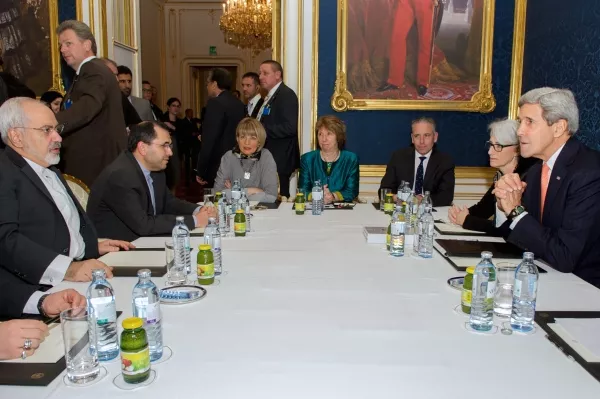Eight members of the Belfer Center's Iran Working Group—Graham Allison, Stephen Bosworth, Chuck Freilich, Nader Habibi, Martin Malin, Payam Mohseni, Gary Samore, and William Tobey—comment on the extension of nuclear negotiations with Iran beyond November 24th and consider potential determinants of the talks' success in the coming months.
Graham Allison, director of the Belfer Center and Douglas Dillon Professor of Government at the Harvard Kennedy School:
When we evaluate the impact of the extension, we must first underscore the vital mission of the negotiations between Iran and the West: to prevent Tehran from developing a nuclear bomb through all possible avenues. If seven additional months of talks are required to achieve an agreement that ensures this outcome, then we ought to let diplomacy run its course. Still, it is not clear that Western powers and Iran will be able to agree in 19 months to terms they could not nail down in 12.
However, simply assuming that the world can hit the snooze button on the Iranian nuclear issue until June 30, 2015, obscures an important reality: Obama and Rouhani must be able to show their domestic hawks some tangible progress before the summer. Call it the Valentine’s Day deadline. If the U.S. and Iran cannot show some progress by mid-February, the negotiations could become, in military parlance, overtaken by events.
Consider the domestic pressures both Obama and Rouhani are facing. The new Republican-controlled Congress will convene in January, and lawmakers are already promising an aggressive package of sanctions that could permanently derail negotiations. Moreover, America will quickly transition into 2016 presidential election mode. In Iran, hardliners are regaining the power and influence they lost following Rouhani’s surprise election and last year’s interim agreement. The Iranian parliament’s continued rejection of Rouhani’s cabinet nominees underscores these tensions.
Negotiators understand these time pressures; in announcing the extension, Western diplomats said they hoped to reach a political agreement by March 1 and leave the rest of the time for figuring out technical issues.
Chuck Freilich, senior fellow at the Belfer Center and former Deputy National Security Advisor in Israel:
The seven month extension agreed between the P5 +1 and Iran essentially freezes the situation in place. This may be the best short-term outcome given two fundamental factors: Iran has refused to make concessions of consequence on the key issues, such as the number of centrifuges and timing of sanctions relief, and a highly conflict-adverse US administration, and its allies, wish to avoid a moment of reckoning and crisis with Iran. Kicking the ball down the field thus serves all sides’ needs, including Israel, for whom the current interim situation is preferable to the probable contours of a final agreement. In practice, it appears highly unlikely that the desired political breakthrough can be achieved by March 1 and that the July 1 deadline for resolving the technical issues will be achieved either. We will have gained half a year, good in itself, but when the next crisis point arises towards July 1, both Obama, who will want to bequeath the issue to the next administration, and Iran, will be hard pressed to justify a further extension, absent manifest progress. These difficulties, notwithstanding, both sides have a fundamental interest in avoiding a breakdown of talks and the resulting crisis and it is thus likely that a further extension will somehow be achieved. There are dangers in perpetuating the interim agreement, but at present it may be the least bad of the options.
Nader Habibi, Henry J. Leir professor of the economics of the Middle East in the Crown Center at Brandeis University, senior lecturer in the Department of Economics:
The news of the extension of the nuclear negotiations for another seven months will have a mixed impact on Iran's economy. It is certainly better than total failure and reaction of Tehran stock exchange in Monday November 24th confirms this. The market index started the day with a more than 1% jump with anticipation of a possible agreement. It gave back half of this gain as investors became aware of the extension of the deadline till June 30, 2015. Investors and industrialists alike, have to cope with another seven months of uncertainty while the negotiations continue. They are likely to be more cautious than after the previous extension in June 2014.
During past six months many Iranian businesses negotiated investment and trade agreements with their foreign partners in anticipation of the lifting of sanctions. Now all of these plans will have to be placed on hold for another few months. Domestic investors will also be reluctant to commit to major investment plans until a permanent agreement is reached. Instead they are likely to continue to park their wealth in relatively safe assets such as foreign currencies, real estate and gold. As a result the exchange rate (the price of dollar and euro) is likely to go up and put more upward pressure on domestic prices. Under the terms of extension Iran's oil exports will remain restricted and it will have access to $700 million per month of its oil export revenues. Limited oil revenues can lead to budget cuts for the next fiscal year.

Martin Malin, executive director of the Project on Managing the Atom at the Belfer Center:
Nearly all concerned agree that an extension of the negotiations between the P5+1 and Iran is better than a collapse of the talks. The question is: What does more time buy? For Iran, it buys steady if limited access to frozen assets, which given the plummeting price of oil must be a source of comfort. It also buys a continuing opportunity to “make the case” that Iran’s intentions are peaceful and that the P5+1’s laser focus on the number of centrifuges it is operating is misplaced. Tehran can hope for cracks in the P5+1’s remarkably united front and for a degradation of sanctions implementation over time. For the United States and the rest of the P5+1, more time means the Iranian program is held in check under the terms of the Joint Plan of Action (JPOA), which is better than the alternative of no deal and no JPOA.
But while an extension may provide additional breathing space for all involved, it is important to recognize that the window of opportunity for a deal is closing, not opening wider. Opponents to a deal in both Tehran and the United States may soon constrain negotiators to such an extent that a final deal slips out of reach.
It is not hard to imagine how Rouhani opponents will increase their criticism of negotiations as a pointless exercise that constrains Iran’s economic and scientific progress. While round after round of negotiations fail to produce an agreement, the United States and its allies, they will argue, are actively working to weaken Iran by maintaining sanctions, driving down the cost of oil, continuing covert attacks on Iran’s nuclear program and undermining Iran’s regional interests more broadly. Within the United States, members of congress who are highly skeptical of the Iran negotiations are demanding a greater role in guiding the US position. Senator John McCain reacted to the news of an extension by stating that “talks should be coupled with increased sanctions and a requirement that any final deal between Iran and the United States be sent to Congress for approval." Either of these two conditions would likely scuttle the entire process.
The sentiment is likely to grow in both Washington and Tehran that the other side is not negotiating in good faith. In this context, it will be tempting for negotiators to use the mounting internal pressure at the bargaining table. Each side will say, “My hands are tied. I’d like to give you what you are asking for but back home they will never allow it.” These statements will be credible. And we all know that tied hands in a game of chicken can sometimes force the other party to yield.
But tied hands can also lead to a crash. It is time to end the game of chicken and to consolidate what has been agreed up to this point. The negotiators should begin to sign and implement small, interim steps, that allow each side to undercut the arguments of internal opponents. The overall goal should remain a comprehensive deal within seven months. But in the meantime, if the two sides agree on distinct elements of that deal, they should sign agreements on those elements, take them off the table, announce the partial agreement, and move forward, demonstrating to their respective publics that the process is producing tangible benefits. It is time to stop thinking of the negotiations as an all or nothing prospect, and to begin taking steps that provide assurance on both sides that progress is possible. If in July 2015, having taken a series of small steps toward a comprehensive deal, the negotiators can’t get agreement on the last and toughest issues, how will we be worse off than if talks collapse with no agreement on anything? Alternatively, if small steps can begin to build confidence in the negotiating process so that the parties can take larger steps at the end, then shouldn’t we begin to explore the risks and benefits of those steps immediately?
Payam Mohseni, director of the Iran Project and fellow of Iran studies at the Belfer Center:
The recent extension of the nuclear negotiations has important implications for both the domestic politics of Iran and its regional standing. Within the country, the diplomatic extension will yet again undercut Rouhani’s power as the hardliners come to claim that the negotiations have not been fruitful and move to more assertively undermine the government. With increasing pressure from the hardliners, Rouhani is more likely to take a stronger nationalist stance and align with the Supreme Leader to protect his position within the Iranian power structure. The domestic game may increasingly lead to international brinkmanship as domestic forces begin to contemplate and compete over restarting Iran’s nuclear program given the possibility that the talks will not result in a final comprehensive agreement. Considering Iran’s strengthened regional position and the chaos on its borders as well as the moderates’ weakened domestic hand following the 2009 presidential election fallout, the moderates will likely play it safe and take a more hard line posture than would have otherwise been expected.
Regionally, Iran’s power and reach throughout the Middle East has increased with the rise of ISIS due to the country’s effectiveness in turning the conflict into leverage and power. Moreover, the Supreme Leader believes that American power is in decline in the region and has called for a new multi-polar world order. Ayatollah Khamenei also believes that the US needs Iran because of ISIS and the weakening power of Saudi as a reliable future ally on one hand, and the increasing conflict between the US and Russia on the other. Consequently, Iran does not sense any urgency to resolve the current nuclear stalemate and believes that time is on its side.
Given these complicating factors, and the limited hand of Rouhani and the moderates in Iran, it is important for the US to reach out and engage the hardliners. The hardliners, as the main spoilers of a potential deal, have nothing to lose if negotiations fail. Many sanctions will not be removed from key actors in this camp as they pertain to non-nuclear related issues. Given the important power they have in Iran and the region, it would be wise of the US to seek out means of engaging and bargaining with these hardline elements to advance American strategic interests in the region and finalizing a deal. Moreover, concluding an agreement will do much for strengthening Iranian moderates at home as it gives them protection against their domestic critics and allows them to play a more constructive role regionally.
Gary Samore, executive director for research at the Belfer Center and former White House coordinator for arms control and weapons of mass destruction:
Failure to reach agreement on a comprehensive nuclear deal within the time frame set by the Joint Plan of Action (JPA) is Iran’s fault. The P5+1 (lead by the U.S.) offered Iran an extremely reasonable – even generous – face-saving proposal that would allow Iran to pursue its peaceful nuclear power program with a limited enrichment capacity and defer coming to terms with the IAEA on its past nuclear weapons program in exchange for graduated sanctions relief. Iran, however, continues to take extreme and inflexible positions. It refuses to reduce its existing centrifuge force of nearly 10,000 operational centrifuges, insists on rapid expansion to industrial scale enrichment and demands immediate and total removal of all sanctions.
Why is Iran acting this way? One possibility is sharp bargaining tactics. Supreme Leader Khamenei may hope to squeeze more concessions out of the P5+1 before offering any Iranian compromises on the eve of the new deadline in June. Another possibility is that Supreme Leader Khamenei does not feel compelled by current conditions to give up Iran’s long standing program to develop a nuclear weapons option. Under the JPA, Iran’s economic deterioration has stabilized. Moreover, recent geopolitical developments, such as the Ukraine crisis and rise of Islamic State may give Supreme Leader Khameini more confidence that Iran’s bargaining leverage has improved and that Iran can weather the collapse of the JPA.
Whatever Iran’s motivations, we will be in exactly the same spot we are today in seven months, unless Iran begins to show some realistic flexibility. The P5+1 should not make any new offers until Iran reciprocates with a serious proposal of its own. More important, the U.S. and its allies need to begin preparing for a resumption of the sanctions campaign in July if there is no comprehensive agreement or enough progress to justify another extension. This means persuading Iran’s major oil customers such as Japan, Korea, and India, to plan for reducing their purchases of Iranian oil after July and persuading other oil producers like Saudi and the Emirates to maintain high production to fill the gap. Congress can also play a key role by passing legislation that authorizes President Obama to impose draconian new sanctions in the event that Iran reneges on the JPA or fails to allow progress towards a comprehensive deal.
Will these actions be enough to persuade Iran to come to terms along the lines proposed by the P5+1? Probably not, but it represents the best chance available and puts us in the strongest possible position to increase sanctions if the JPA collapses in July.
Will Tobey, senior fellow at the Belfer Center and former Deputy Administrator for Defense Nuclear Nonproliferation at the National Nuclear Security Administration:
Whether or not extending the nuclear talks with Iran turns out to be a good thing or a bad thing will depend on how the time between now and the new deadline—seven months hence—is used. Iran’s declared nuclear facilities are farther from being able to produce a nuclear weapon than they were at the outset of the Joint Plan of Action, a year ago, mainly because they have drawn down their stock of uranium enriched to nearly 20 percent U-235. That is good, but not sufficient, because Iran’s declared facilities are the least likely path Tehran would choose to acquire nuclear weapons.
Far more likely would be covert facilities, which Iran has built time and again. The best ways to guard against such clandestine efforts are to understand fully what Iran did in the past—who, what, where, and when—and to monitor comprehensively all materials and technologies in Iran that could have a nuclear weapons application, both imported and indigenous. While western negotiators claim to be pressing hard on the second issue, they’ve gotten nowhere on the first, and may have given up. Iran has stonewalled the International Atomic Energy Agency (IAEA) on the dozen issues raising Agency suspicions about “possible military dimensions” to Iran’s nuclear program. Therefore, the Agency can no longer provide assurance that all the nuclear material in Iran is being used for peaceful purposes.
If Iran has not been truthful about its past activities, how can we believe Tehran’s assurances about a future deal? If the negotiators conclude an agreement without insisting that these issues are resolved to the IAEA’s satisfaction, why in the world would anyone have any confidence that it can be verified?
Allison, Graham, Stephen Bosworth, Chuck Freilich, Nader Habibi, Martin B. Malin, Payam Mohseni, Gary Samore and William H. Tobey. “Belfer Center scholars weigh the extension of negotiations with Iran past November 24th.” November 24, 2014














